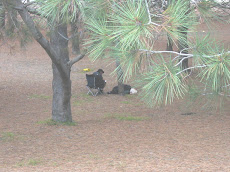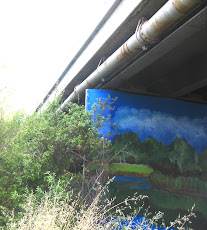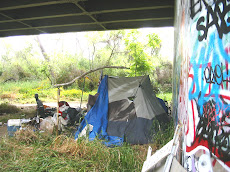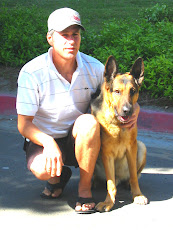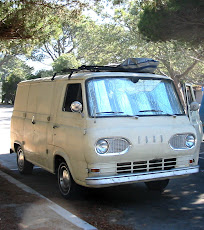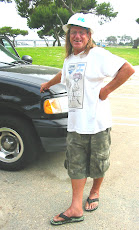So, it was on to the cyber-cafes, coffee shops that offer customers free outlets, where I could recharge my cell phone and get online. But gasoline was going up and hovering at around four dollars a gallon, so travelling hither and yon to plug in was getting expensive and nearing out-of-reach. It occurred to me that Radio Shack might have a whatchamacallit, and I trusted the young man at the counter would not only be patient, but clairvoyant.
Indeed, the gizmo I wanted is known as an "inverter," which plugs into a vehicle's cigarette lighter and delivers electricity from the battery to your cell phone --- or lamp (so long as you use the new compact fluorescent, instead of the old-style light bulb). I mention this because my old vehicle lost its interior lighting a long time ago.
And, thus, the experience of homelessness evolves.
It took months to come to the idea of visiting Radio Shack, even though it would seem absurdly obvious. There is so much else on one's mind, though, and not all of it good. I suppose, too, at first, I was trying to use just whatever I had available: I was doing crossword puzzles by flashlight for a very long time, holding the crossword book and flashlight in one hand and pen in the other. Of course, doing crossword puzzles is a longstanding, comforting habit, which, as such, was important in itself. It takes a while emotionally to settle in and feel at ease with oneself under conditions regarded as culturally extreme.
A radio is handy, too. Of course, your vehicle probably already has one; mine doesn't, so I cannot adequately express my sense of accomplishment in finding a pocket-size, digital AM-FM for ten bucks at Long's Drug. Having a computer with portability, like a laptop, or maybe one of those new cell phones that connects to the internet is also recommended as the general idea here is to stay connected in as many ways as possible, in this case, to the nation's social and political discussion. After all, homelessness is a current issue, and the homeless are being discussed.
It gave me an odd feeling a few weeks ago hearing myself talked about, in a sense, in the third person while I was present and listening. I was tuned into a local public radio program on the homeless. It was all about what to do with us. The members of the panel, of course, were informed and the callers-in well-meaning, but they may as well have been talking about feral cats or stranded whales. It would be nice, somehow, to get across to the general public, but especially to policy-makers, that the homeless are a wide swath of sundry persons. I cannot stress this enough. My fear is that I/we could end up in internment camps or, even worse, high-rise projects. After all, it took a lot of well-meaning people to create Cabrini-Green.
My fear is not baseless. A few months ago, I attended Homeless Court (more on this later), which is hosted by St. Vincent de Paul Village. Now, no one in her right mind would pick a bone with Father Joe's Village, as it truly is a leader in providing services to many homeless people and probably the best care available for homeless families. But imagine this for a moment: here I am, dressed to the nines for a day in court --- skirt, heels, jewelry, make-up --- when, nervous about facing the judge, I needed to find a lady's room. I am directed down one hallway to another, where I pass a long folding table with rows of tiny, thimble-sized paper cups on top. There are labels taped to the table at the head of each row that read, "Soap," "Mouthwash," "Toothpaste," "Lotion," and so on. I am stunned.
My mind is a jumble for a few seconds as I take in the scene. When I can finally sort out one thought, it is an exclamation: wow, I use a whole lot more soap, shampoo, toothpaste, you-name-it, than what is in those little paper cups! Then I notice there are two women sitting behind the table who are not smiling and who seem to be guarding the tiny cups. They are not, apparently, there to greet people. So I am wondering what kind of reception I would get if I took two or, God help me, three of those tiny cups. I would probably need, at least, four of those cups with shampoo. In a few seconds, I have done the math and now wonder if toiletries are portioned due to shortage, wastage, or shrinkage, to borrow the business euphemism for theft, or all three.
Up ahead, in front of me, I see a cafeteria with tables for two and four and a few people eating. A glance to the right, and there is another table with tiny cups and men sitting behind it. I realize I am probably in the Day Center where the homeless can get a hot meal and a shower. Finally, at the end of the table and behind it to the left, I spot the lady's room. My relief to get away from the scene I have just walked through is quickly supplanted by a much weirder experience.
There are a number of women in the lady's room, which has a row of sinks, toilet stalls, and an open shower area. There is a woman showering and another getting dressed, both in full view, and I am feeling a bit embarrassed at my intrusion on their privacy. There is another woman seated, dressed, and staring out, but she does not seem to see me. There are two or three women using the sinks, but no one looks up. No one glances from the mirror. I wash my hands, then turn to the dispenser for paper towel --- empty. I make a comment, something brief and chatty, but no one responds. No one turns around.
I am in a deaf, mute world; and I am invisible.
I choose a stall and, as is my custom, I look first for the toilet-seat covers, but there are none; they are not provided. My fallback is to lay paper down on the seat, but the toilet paper comes off the roll one sheet at a time, not in a strip. So I squat and do my best not to make drops on the seat. I am working hard, at the same time, to collect enough single sheets to wipe dry. It occurs to me how much I love toilet paper, all paper, every kind, and that I use a lot of it. Then, I exit this corner of hell as quickly as I can without running.
I cannot seem to get enough oxygen until I am well past the tiny-cup tables; but those images, what they mean, what they imply, have haunted me ever since. I go over the particulars in my memory in an attempt to understand them and to allow the numbing fear to trickle in slowly; for I think they mean something I do not want to know: loss beyond sanity's threshold.
Safe beyond the prison-like atmosphere of the Day Center, back in my truck and in a reflective mood, I head home. I drive out to a spot where the San Diego River meets the Pacific and watch the sunny, late afternoon turn to early evening. The fog billows gently, slowly, in from sea, to cover everything like a blanket. The air cools, and the breeze strengthens. Yes, this is home.





